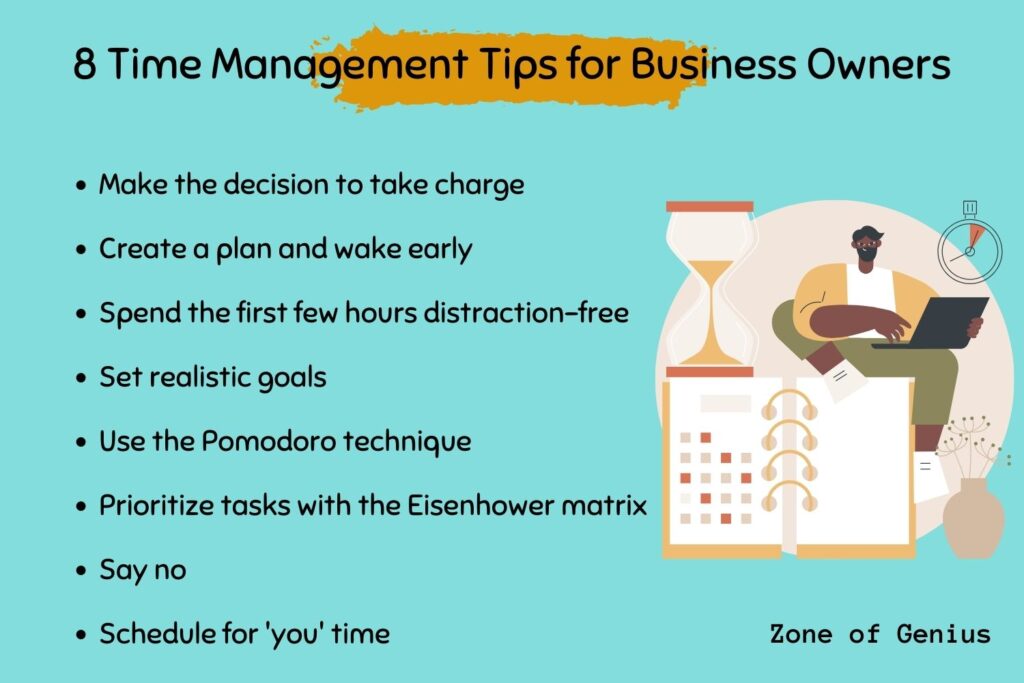Outline: Benefits of Time Management | Why Can’t We Manage Time? | Time Management Tips for Business Owners | Final Thoughts
Time management can boost productivity in both your life and your business. This is true for entrepreneurs, project managers, and business owners. Individuals who take care of their family and still run a business are not excluded.
We often make New Year’s resolutions that revolve around health, fitness, finances, family, and work/life balance. But when it comes to achieving them, our daily challenges often get in the way. And while there are plenty of apps for managing time and tasks, who can remember to use them all the time?
The problem is that we either forget or get too distracted to implement all these essential tools in our lives. In the absence of a personal assistant who can schedule everything for you, you will need effective time management strategies to perfect your time-tracking skills. More importantly, you need to learn to be more productive from one day to the next.
This article is for you, a business owner, manager, employee, or someone who needs the hack to be productive in their dealings.
Benefits of Time Management in Your Business
After setting goals and laying out plans to achieve them, we need to be productive in every step of the plan to get good results. Being productive means smart work that you can account for and not being merely busy with no results.
Time management strategies can help you and your employees achieve great heights as a business and individuals.
Here are some benefits of time management in your business:
1. You reach goals faster
With proper time management, you and your employees or teammates get work and plans done on time. There’s no rush, stress, or anxiety trying o reach a deadline. It creates room for a smooth workflow.
2. Everyone does their job better
With enough time to plan and carry out our tasks, there is better work quality and output. Procrastination makes you get things done last minute. On the other hand, well-managed time helps you get a better grasp of what you are working on, looking forward to, and the results you are getting.
3. The gift of confidence
This feeling comes with knowing that you are disciplined enough to get things done. A business that applies time management principles has more confident employees, managers, and teams. You become a leader that leads action takers, doers, and critical thinkers. This quality gives you, your employees, and your business a boost that your customers can see. Thus making people want to be a part of what you are building.
4. Work-life balance
When you leave tasks for yourself and employees till the last minute, you get tired individuals working night and day to meet deadlines. You can avoid having tired employees. In your business creed, how you treat your employees may affect the business. So, you can take charge and ensure your employees’ mental and physical health is your priority. More importantly, just like you want growth in your business while maintaining good relationships with your family and friends. Create that room for your employees too.
5. It helps you make better decisions for your business
Getting things done ahead of time can help you see issues with a plan or make adjustments. A good workflow allows a business to act promptly. In your life, doing things on time, going to the gym, and not missing that doctor’s appointment will help you improve your mental and physical health.

Why Can’t We Manage Time?
If you’ve ever made plans that didn’t pull through because of an emergency, we can agree that it’s no one’s fault. However, when it becomes a recurring event, we might have to check why we can’t manage time.
As a business owner or manager, you may have to balance work, family time, business trips, and many others. This is even more tricky when you don’t have an assistant. But if you have one, you also have to learn how to manage your time. And do your tasks to ensure your employee is growing too, not just carrying out menial tasks you failed to do. Remember that you have a career plan for your employees.
Here are some of the reasons why we can’t manage our time efficiently as individuals:
- We put too many tasks in our plans
- We don’t prioritize
- Inability to ward off distractions
- Procrastination
- We want everything to be perfect
- Fear of failing/getting it wrong
- Poor organization skills
- Absence of a strategy for ourselves or our business
- Unexpected events
- Inability to say no to things outside our schedule
Which of these reasons apply to you? The good news is that you can work on changing your approach for the reasons above.
What about unexpected emergencies? While there’s not much we can do about unplanned events; we can have a better approach to these events.
8 Time Management Tips for Business Owners
Productivity is vital for a business to grow. More importantly, we need to be productive to reach our goals and fulfill the plans we have laid out.
Suppose you’ve ever wondered why a week went so fast. Or why you haven’t finished your tasks despite being busy, up your time management skills can help you see results for your daily activities.

1. Make the Decision To Take Charge
Most accomplishments come from a mind that has chosen to take charge and bring their dreams to life. A mindset change is the most important thing you need to become productive.
Consider the things you want in your life, your business, and your employees. Also, it might take some time and discipline to achieve them.
You may want to write the steps you want to take and put a time frame. Read it every day before starting your day. It reminds your inner self of what you expect and wants for yourself.
2. Create a Plan and Wake Up Earlier
This may sound obvious, but there is a good reason why successful people tend to wake up early. They don’t waste time procrastinating about getting started with their tasks for the day; they’re ready to hit the ground running each morning.
The key is to set your mind on what you want to accomplish before you go to bed. The night before, write down all the things that need to be accomplished during the next 24 hours. Also, note any appointments or meetings scheduled for the day so you won’t forget them in the morning rush. Then, when you wake up in the morning, you’ll have a clear picture of what needs to get done.
Tackle the most demanding tasks first so they don’t get pushed to the next day as your day goes on. Begin your day by reviewing the tasks you wrote down the night before. Then go through your calendar, and prioritize your tasks accordingly — block out any time needed for meetings, appointments, or other commitments, accounting for anything new that arose in the morning.
3. Spend the First Few Hours Away From Distractions
Even the best-laid plans can get thrown out of whack as your day starts. Suddenly, your inbox is overflowing with messages from colleagues and clients, and your phone constantly buzzes with notifications from social media accounts and other apps. How can you make sure you don’t miss anything important?
Try delegating a specific tie of the day to check inboxes and emails. However, you have to get your important tasks done first. An alarm that tells you when to get off social media might be a great start.

4. Set Realistic Goals for Your Day and Week
Certain tasks will take longer than others, while some may take less time than you think. That’s why you have to be realistic about deadlines and the time commitment involved. This will help you budget your time accordingly.
For more involved tasks like completing a client project or reviewing a spreadsheet, add 30 minutes to your allotted time to allow interruptions, phone calls, and breaks. If a task takes longer than expected and you’re not on a deadline, then simply move on to something else instead of worrying about the task at hand.
5. Use the Pomodoro Technique
The Pomodoro Technique is a time management technique developed by Francesco Cirillo. While this technique involves several steps, the crux of it is breaking down work into 25-minute intervals called “pomodoros,” followed by five-minute breaks. You can use this technique when working with a team for personal tasks.
With the Pomodoro Technique, you can commit to focusing on one task at a time without getting distracted or overwhelmed by all the other things that need attention. Chunking down your work helps you get into a flow state where you can be highly productive in focused intervals without feeling burnt out or distracted.
6. Use the Eisenhower Matrix to Prioritize Tasks
Many people hesitate to delegate tasks because they don’t want to lose control over something important or valuable. However, delegation is an effective way to free up your time and allow employees to take charge and grow.
As a business, the Eisenhower matrix helps you prioritize tasks according to what you should be handling. It also helps you identify important, unimportant, urgent tasks and tasks that are not urgent.
Since it is considered best practice to help your employees grow in their careers, you should learn to delegate tasks. Here are a few tips that can help;
- Guide them through the process if it is their first time doing that task
- Let them understand how the task improves their skills
- Be patient with them
- Have a promotion in mind when handing out these tasks
- Lead well
Leading and guiding them through helps create a tradition where they can help your other employees.
When delegating tasks, always consider the person’s tasks and tasks. You should try not to tire the individual out with tasks that help them grow.
7. Embrace the Act of Saying No
We are not talking about saying no to our dreams, plans, or important meetings, and certainly not to emergencies. After making plans, we have to say no to unimportant events (remember the Eisenhower matrix?) that come up during the day.
When people start asking you for favors outside of what’s expected of you at work or home, it can be tempting just to say yes in order to keep the peace. But if saying yes means taking on more responsibility than you can handle or doing something that doesn’t fit into your schedule, then it’s best not to commit yourself too quickly.
Instead, take your time to analyze if the task needs urgent attention. Afterward, if it isn’t urgent, explain why it might not work out right now, but offer to help them out later if they need help again. And don’t be afraid to say no when someone asks you to do something outside your responsibilities or comfort zone — or something that isn’t a good use of your time and energy.
Also, don’t be afraid to say NO to social media distractions. You don’t want to find yourself launching into news feeds on Twitter or stories on Facebook— It never feels good afterward.
8. Schedule Your “You Time”
If you’re like most people, you have a lot of things to do — and that’s probably why you’re reading this article in the first place. You have a job, family, friends, and other responsibilities. You want to exercise, read books, catch up on the latest movies, and hang out with family and friends.
Yes, it’s easy to get overwhelmed when you feel you have too much to do in too little time. If you’re serious about productivity, however, you must also schedule time for yourself. Rest, hobbies and fun are just as important as your to-do list.
Final Thoughts
Effective time management and productivity make you feel more relaxed as you go about your day, knowing everything will get done at the right time and pace. Remember to audit your time occasionally to see where it goes so you know if you spend too much time in one area than others.
And while there are tons of time management and productivity tricks out there, the advice above should be enough to make a difference in your day-to-day activities. You’ll just need to commit to using them, which will require effort. But over time, you’ll likely feel better about how you spend your time and find it easier to get things done.
Good luck as you start today!




